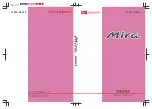
STARTING A DIESEL ENGINE
Cold or Hot Engine
All Vehicles
Note:
When the temperature is below -15°C
(5.0°F), you may need to crank the engine
for up to 10 seconds.
Note:
You can only operate the starter for
a limited period of time.
Note:
After a limited number of attempts
to start your engine, the system will not
allow you to try again until a period of time
has elapsed, for example 30 minutes.
Switch the ignition on and wait
until the glow plug indicator goes
off.
Vehicles With Manual Transmission
Note:
Do not touch the accelerator pedal.
Note:
Releasing the clutch pedal while the
engine is starting will stop the engine
cranking and return to ignition on.
1.
Fully depress the clutch pedal.
2. Start the engine.
Vehicles With Automatic Transmission
Note:
Do not touch the accelerator pedal.
Note:
Releasing the brake pedal while the
engine is starting will stop the engine
cranking and return to ignition on.
1.
Move the transmission selector lever
to position park (P) or neutral (N).
2. Fully depress the brake pedal.
3. Start the engine.
Failure to Start
Vehicles With Manual Transmission
If the engine does not crank when the
clutch pedal has been fully depressed and
the ignition key is turned to position
III
.
1.
Fully depress the clutch and brake
pedals.
2. Turn the key to position
III
until the
engine has started.
DIESEL PARTICULATE FILTER
The filter forms part of the emissions
reduction system on your vehicle. It filters
harmful diesel particulates (soot) from the
exhaust gas.
Regeneration
WARNING
Do not park or idle your vehicle over
dry leaves, dry grass or other
combustible materials. The
regeneration process creates very high
exhaust gas temperatures and the exhaust
will radiate a considerable amount of heat
during and after regeneration and after you
have switched the engine off. This is a
potential fire hazard.
Note:
Avoid running out of fuel.
Note:
During regeneration at low speed or
engine idle, you may smell a hot metallic
odor and could notice a clicking metallic
sound. This is due to the high temperatures
reached during regeneration and is normal.
Note:
Changes in the engine or exhaust
sound may be heard during the regeneration
process.
118
Ranger (TKE) Vehicles Built From: 02-05-2016 Vehicles Built Up To: 04-09-2016, EB3B-19G219-AKC enGBR, First Printing
Starting and Stopping the Engine
Summary of Contents for RANGER 2016
Page 1: ...FORD RANGER Owner s Manual ...
Page 3: ......
















































